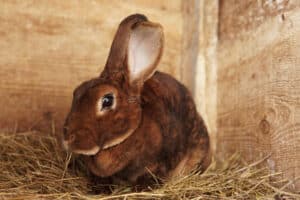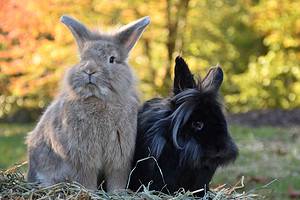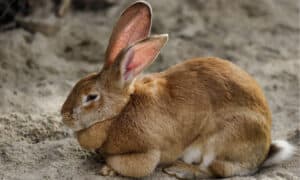Holland Lop is a small breed of rabbit that is a popular pet in the United States and the United Kingdom. The Holland Lop is one of the smallest breeds of lop-eared rabbits. A lop-eared rabbit is one whose ears lay down flat instead of standing upright. According to the American Rabbit Breeders Association (ARBA), the maximum weight of a Holland Lop rabbit is only four pounds. Holland Lops are a calm and friendly rabbit breed, making them great pets. However, all pet rabbits require proper care to thrive. This Holland Lop guide covers everything you need to know about these lovable animals.
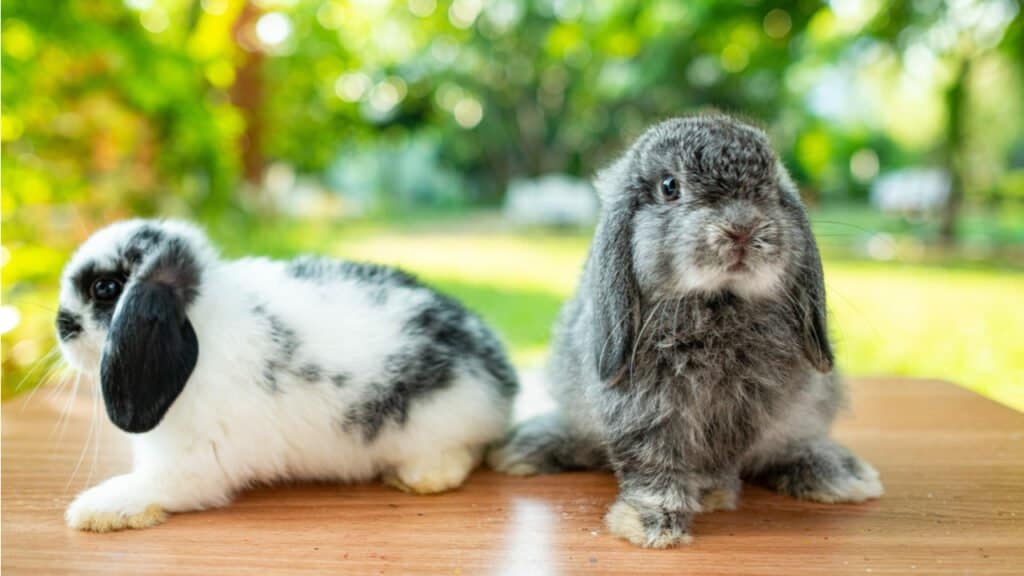
A Holland Lop rabbit weighs between two and four pounds.
©suriyachan/Shutterstock.com
Overview and Organization
- 5 Most Important Things to Know About Holland Lops
- Introduction to Holland Lop Rabbits
- Care and Maintenance
- Feeding and Nutrition
- Socialization and Training
- Health and Wellness
The 5 Most Important Things to Know About Holland Lops
Here are the most important things to know about Holland Lops. The following sections cover each of these important facts in more detail.
- Holland Lops are calm, friendly, and playful
- Holland Lops require basic rabbit care to be happy and healthy
- Holland Lops need unlimited access to fresh water and hay
- Holland Lops are highly intelligent and trainable
- Holland Lops, like all pet rabbits, require care to avoid dental and digestive issues
Introduction to Holland Lop Rabbits: Discovering the Charms and Traits of These Lovable Pets
History
Holland Lop rabbits became an official American Rabbit Breeders Association breed in 1979. The breed was developed by Adrian de Cock, a Dutch rabbit breeder. Adrian de Cock bred Holland Lops as a hybrid of French Lop and Netherland Dwarf rabbits. French Lops are about 11 pounds while Netherland Dwarfs are 1-2 pounds. These breeds combined created the Holland Lop, which is 2-4 pounds. Holland Lops are a four class breed of rabbits, meaning they are a small breed. The two classes of rabbits for competitive shows are four class and six class. Four class rabbits are smaller and compete in fewer categories, while six class rabbits are larger and compete in more categories.
Behavior
Holland Lops make great pets due to their calm, friendly, and playful temperament. They can be slightly shy at first, but easily warm up to people. Holland Lops are easy to handle, meaning they are generally comfortable being touched. They are fairly active and enjoy lots of play and attention. This Holland Lop guide will help you keep these friendly rabbits happy and healthy.
Care and Maintenance: Understanding the Essential Needs and Requirements for Keeping Holland Lop Rabbits Happy and Healthy
Holland Lop rabbits generally require the same care as other pet rabbit breeds. In this section, we discuss rabbit habitat and grooming. The next two sections of this Holland Lop guide explore rabbit nutrition and socialization in detail.
Indoor vs. Outdoor
The safest and most comfortable way to house Holland Lops rabbits is indoors. While it was once more common to house pet rabbits outdoors, this leaves them more vulnerable to parasites, predators, and extreme temperatures. There are many ways to house an indoor rabbit. The first is a dedicated room where the rabbit can roam freely. Other options are a puppy crate or an indoor bunny hutch. Any enclosure needs to be large enough for a Holland Lop to be comfortable and move around. Since Holland Lops are a smaller breed of rabbit, they require an enclosure no smaller than 24 inches wide by 36 inches long by 24 inches high. There are many great options for enclosure flooring, but it is important to avoid wire flooring. Wire flooring is uncomfortable for rabbits.
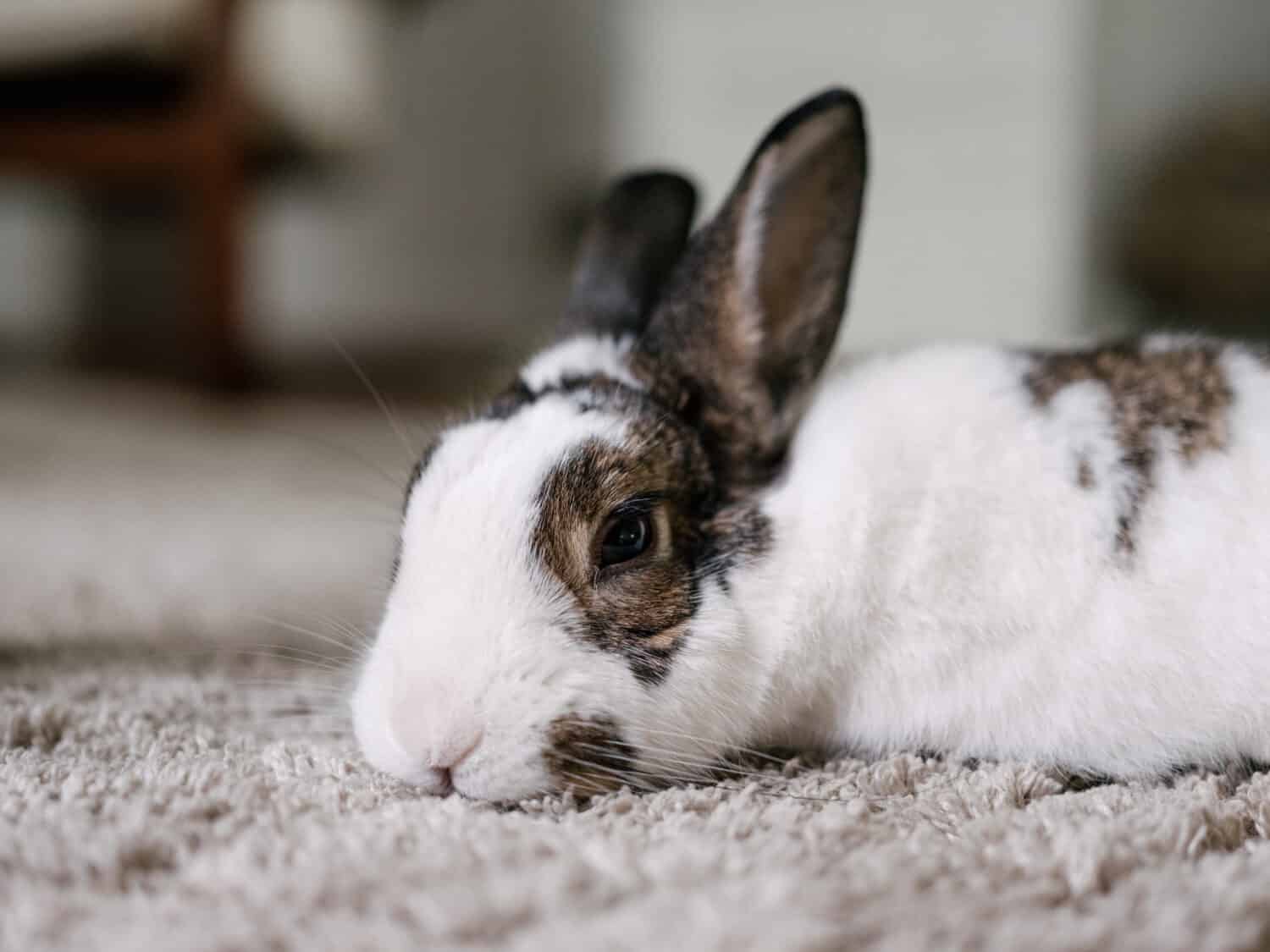
A happy Holland Lop needs time each day to roam freely.
©Oakland Images/Shutterstock.com
Free Roaming Time
In order to be happy, pet rabbits also need time each day to roam freely, outside of an enclosure. Therefore, to safely house a Holland Lop indoors, you will need to bunny-proof your house. There are a few simple and important steps to keep both your rabbit and your home safe. First, block off any areas you do not want the rabbit to access. Then, cover any exposed wires to prevent the rabbit from chewing them. Finally, you may also choose to cover your baseboards to prevent chewing. While your rabbit is roaming freely, you can play with them using toys, obstacles, and treats. Holland lops especially enjoy play.
Grooming
Holland Lops have short hair, so their grooming requirements are fairly simple. It is best to brush them a few times a week. A grooming glove is the most gentle option for brushing. When Holland Lops start to molt, which happens around every three years, they need daily brushing. Like all pet rabbits, Holland Lops do not require bathing. Holland Lops are small and therefore delicate, it is important to be careful when handling and grooming them.
Diet and Nutrition
Pet rabbits also need plenty of water and nutritious food. The next section covers food and water in detail. Pet rabbits also need proper socialization and handling, which is covered in the following section.
Feeding and Nutrition: Exploring the Proper Diet and Nutritional Considerations for Holland Lop Rabbits
Like all pet rabbits, Holland Lops need unlimited access to fresh water. For water, rabbits actually prefer bowls to bottles. Drinking from a bowl is more natural. A rabbit’s water bowl should be changed every day so that the water is fresh. As for nutrition, all rabbits need to eat a proper diet. First, rabbits need unlimited access to grass hay or fresh grass. Grass must be fresh, so lawn clippings are not suitable for rabbits. Hay is essential for keeping a rabbit’s digestive tract healthy. Rabbits also need high-fiber rabbit food. Fresh green vegetables are also an important part of a rabbit’s diet, but they are not sufficient on their own because they do not provide enough fiber. Rabbit pellets are the final part of a balanced diet. However, rabbits do not need pellets daily and it is best to feed them only in small amounts.
Socialization and Training: Tips and Techniques for Bonding with and Teaching Holland Lop Rabbits
Socialization
Although rabbits have a reputation for being easy pets, they require proper attention and socialization to be happy. Holland Lops are active and playful, so they need plenty of attention and interaction. Holland Lops are happiest when they are able to play and connect with their owners every day. Additionally, these rabbits do best when they live in pairs or groups. Rabbits are highly social, so they prefer to be around other rabbits. It is best to adopt more than one rabbit so that they get to have healthy social lives.
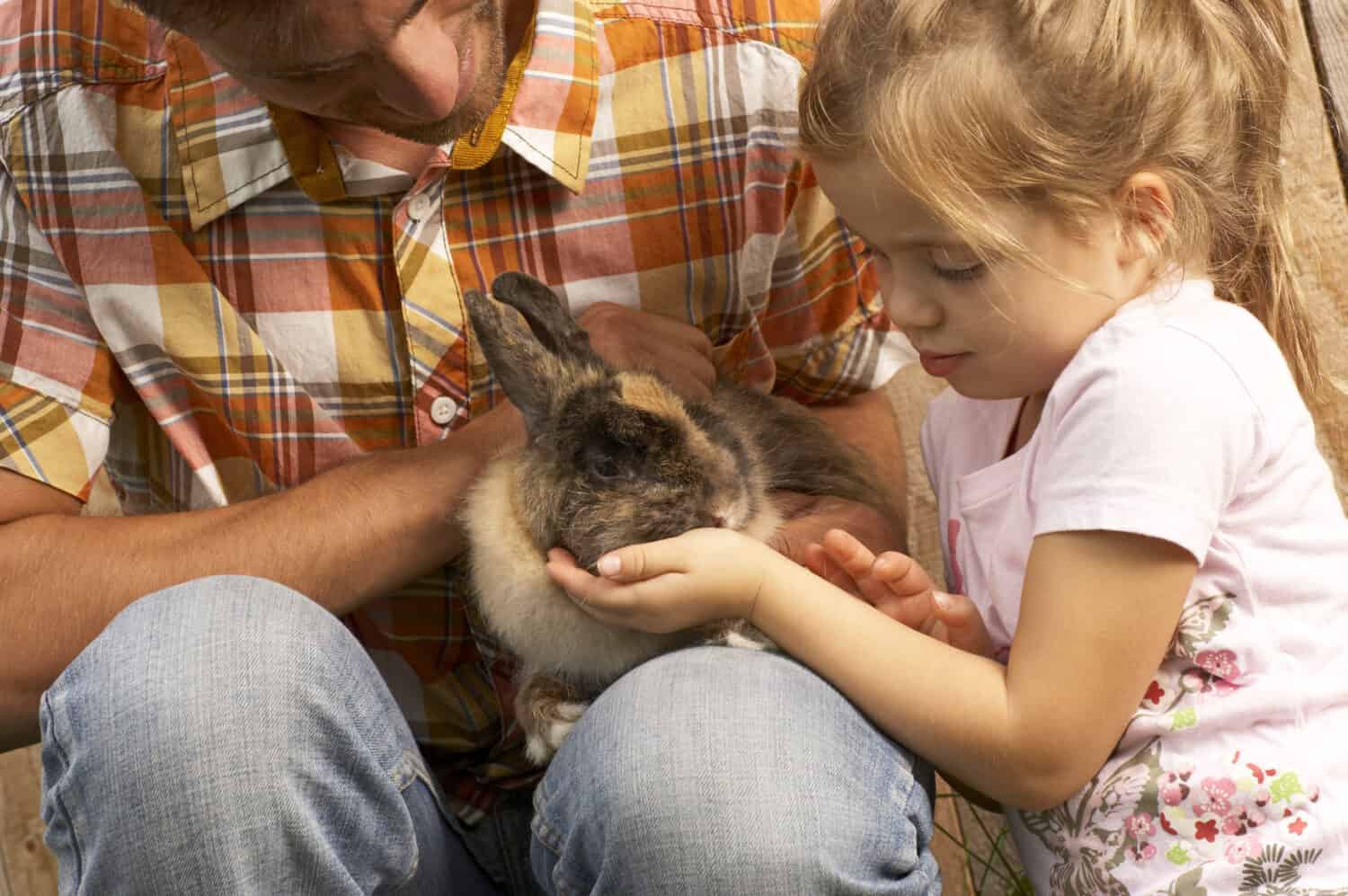
Daily socialization is important to keep a rabbit happy and healthy.
©Altrendo Images/Shutterstock.com
Training
Holland Lops, like all rabbits, are highly intelligent. Holland Lops are easy to train and highly motivated by treats. One of the first things to teach a rabbit is how to come when their name is called. This is a very useful skill, as it can help you find your rabbit while they are roaming around the house. Rabbit training is similar to dog training, it uses classical conditioning. Classical conditioning is when a neutral stimulus, such as a rabbit’s name, is connected with a positive one, such as a treat. In addition to learning their name, Holland Lops can also learn a variety of tricks.
Health and Wellness: Recognizing Common Health Issues, Regular Veterinary Care, and Maintaining a Safe Environment for Holland Lop Rabbits
Holland Lops have the same health concerns as other pet rabbits. They do not have any specific hereditary issues. The most important health concerns for pet rabbits are dental health and digestive health. To prevent dental disease, rabbits need a balanced diet. Signs of a potential dental health issue include loss of appetite, salivating, and dropping food. A rabbit with these symptoms needs to see a vet. A healthy diet is also the most important way to keep a rabbit’s digestive tract healthy. One way to be aware of digestive troubles is to make sure your rabbit is drinking, eating, and moving their bowels. If a rabbit does not do these three things daily, there may be a digestive issue. If you suspect a digestive issue, it is important to visit a trained vet.
The photo featured at the top of this post is © suriyachan/Shutterstock.com
Thank you for reading! Have some feedback for us? Contact the AZ Animals editorial team.



